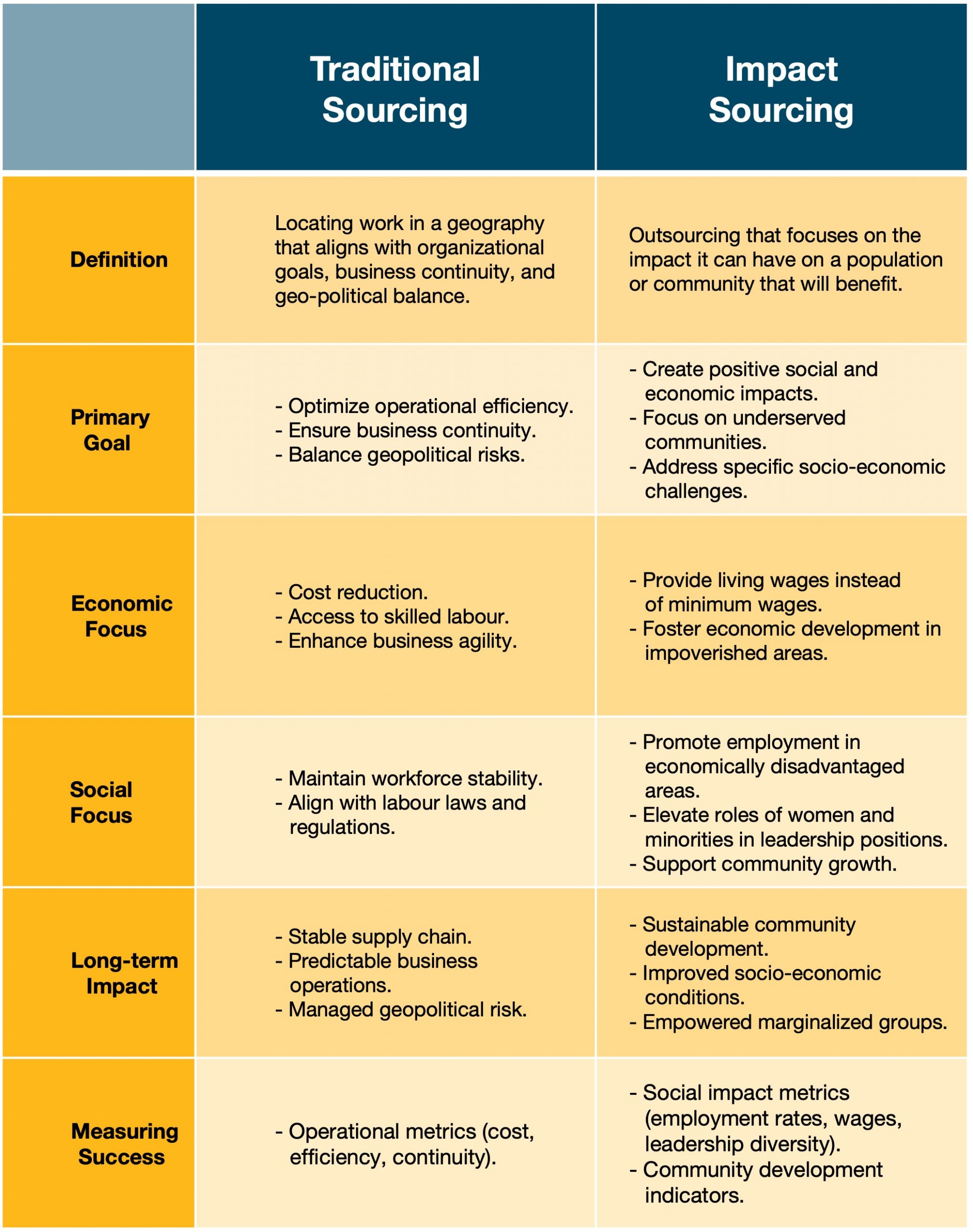
Global companies today are increasingly challenged to align their operations with corporate social responsibility (CSR) goals. While traditional sourcing, such as offshore contact centres, has been the go-to strategy for optimizing efficiency and reducing costs, impact sourcing offers a compelling opportunity to make a real impact.
Understanding the difference
Traditional sourcing means researching and contracting a portion of your operations in a company that provides Business Process Outsourcing (BPO) services to deliver your customer-facing processes. The value is that the company can entrust and pay for their operations to be done with minimal day-to-day oversight, and focus on other priorities while their repetitive customer service processes are handled for them. Over the decades, there has been a shift in sourcing for North American companies from in-house, to in-country with a BPO and then for the past 20+ years, new countries have emerged as leaders in the traditional sourcing world, such as the Philippines and India. These countries have emerged as significant cost reductions for companies as their rates are much more attractive.
Impact sourcing has roots in an early version of a definition provided by the Rockefeller Foundation: “Impact sourcing is an inclusive employment practice through which companies in global supply chains intentionally hire and provide career development opportunities to people who otherwise would have limited prospects for formal employment.” (Source: Rockefeller Foundation on Global Impact Sourcing Coalition)
Impact sourcing may not be new, however it’s still relatively unknown by companies as they rely on traditional BPOs to help them find the right location to deliver their services and are more focused on the right billable rate vs the agent conditions of employment. As the agents are not their employees, companies think less about the sourcing from a global perspective of where their investment dollars for customer support might be best placed to make a difference in the lives of people in more needy countries. Companies focus on their customer relationships, where they can change processes, policies and ensure their agent tools are the most efficient to resolve customer enquiries. Rightly so! BPOs have spent decades building out processes in local countries and continue to grow existing options and focus less on where they can make an impact in the world. This is changing as more BPOs are looking at Africa as a viable option to do business, and more importantly as they navigate the complexity of doing business there.
Defining impact
Impact can be defined in many ways, from generic to specific goal-oriented. There is a school of thought that any job in Africa is impactful to the local unemployment rate and there is merit to that argument. Empathetically, agents in BPOs need more than a job at minimum wage, they need a career, to help their families and communities and see change in their local communities that can be tied to employment and investment. In Africa, there is also an opportunity to make a difference in the role that women play in leadership and the impacts they will make as a part of your management team.
Determining whether your goal is traditional or impact focused depends on what you are looking to achieve from the investment of dollars into your support function. It also can depend on the amount of expertise you need locally, your business continuity planning or maybe it’s driven by proximity to your home country. You can achieve your customer goals with either choice, however you may find a more emotional connection to choosing impact as your strategy.
An at-a-glance comparison
As you’ll see from the chart below, impact sourcing not only meets business objectives but also fosters positive social change by empowering underserved communities and can be a powerful strategy for achieving both business success and meaningful social impact.

Placing your operations in Africa through traditional sourcing can make a difference, but the impact mantle comes from defining a specific impact statement you want from the location and partner you choose. For example, opening a contact centre in South Africa will be meaningful in the lives of the folks that work at your site. Previously disadvantaged employees of the contact centre will be hard-working, deliver results and hopefully keep their jobs sustainable over time. However, to be defined as a real impact, you need to understand how to measure whether you have succeeded in the impact, which means you need to more specifically define your impact with goals.
A good place to start
Here are two ways you can set Impact goals for your program that are easy to do but hugely impactful for the workers who will deliver for your customers:
Living Wage vs Minimum Wage: Do some research to understand not just the individual country’s minimum wage, but go further to understand what a family of 4 would need to live comfortably. This may end up being 2x - 3x the minimum wage, but the value to you as a business owner in considering a different billable rate is a longer relationship with the agent and increase retention as well as getting the best talent to work on your program, knowing that agents who make living wage are more likely to want to keep that job and deliver high results for your customers.
For example, in Ghana today the minimum monthly wage is approximately 700 Ghanaian Cedis, with an average wage for an individual around 1,600 Cedis. However a family of 4 to live comfortably would need around 2,500 Cedis. Remember that part of the journey in Africa is that the job with your contact centre may be the first job in the family, two family incomes may not be the norm. This is not to suggest that you negotiate 2,500 Cedis in this case, but ensuring you are working with a partner that can bridge the path to 2,500 is the right outcome.
Working with your BPO to balance wages with billable rates will get you to a fair outcome on behalf of your new team.
Women in Leadership: The goal here is to provide guidance to your BPO partner in how you would like to see DEI specifically in the management team. If you ask any BPO today the percentage of women in the workforce, they will proudly provide a very healthy number of women overall, as both men and women equally can do the same job at a BPO. However, if you probe further to ask about the percentage of senior leaders who are women, you may not find the same ratio.
Be prescriptive and ask for an African woman to lead your program, and also set a percentage of women in leadership positions for the BPO team. You will be jump-starting equity in a purposeful way and gaining the benefits of the important role that women play within the contact centre, but also in their local communities.
Let's Talk About Your Goals
When you compare the two sourcing models, it’s clear that impact sourcing is a bold but entirely achievable choice for companies who want to drive sustainable community development while still achieving operational goals.
Embracing impact sourcing allows businesses to make a significant difference, proving that profitability and social responsibility can go hand in hand.
Ready to find out how impact sourcing can help you achieve your CSR goals? Let’s talk.



